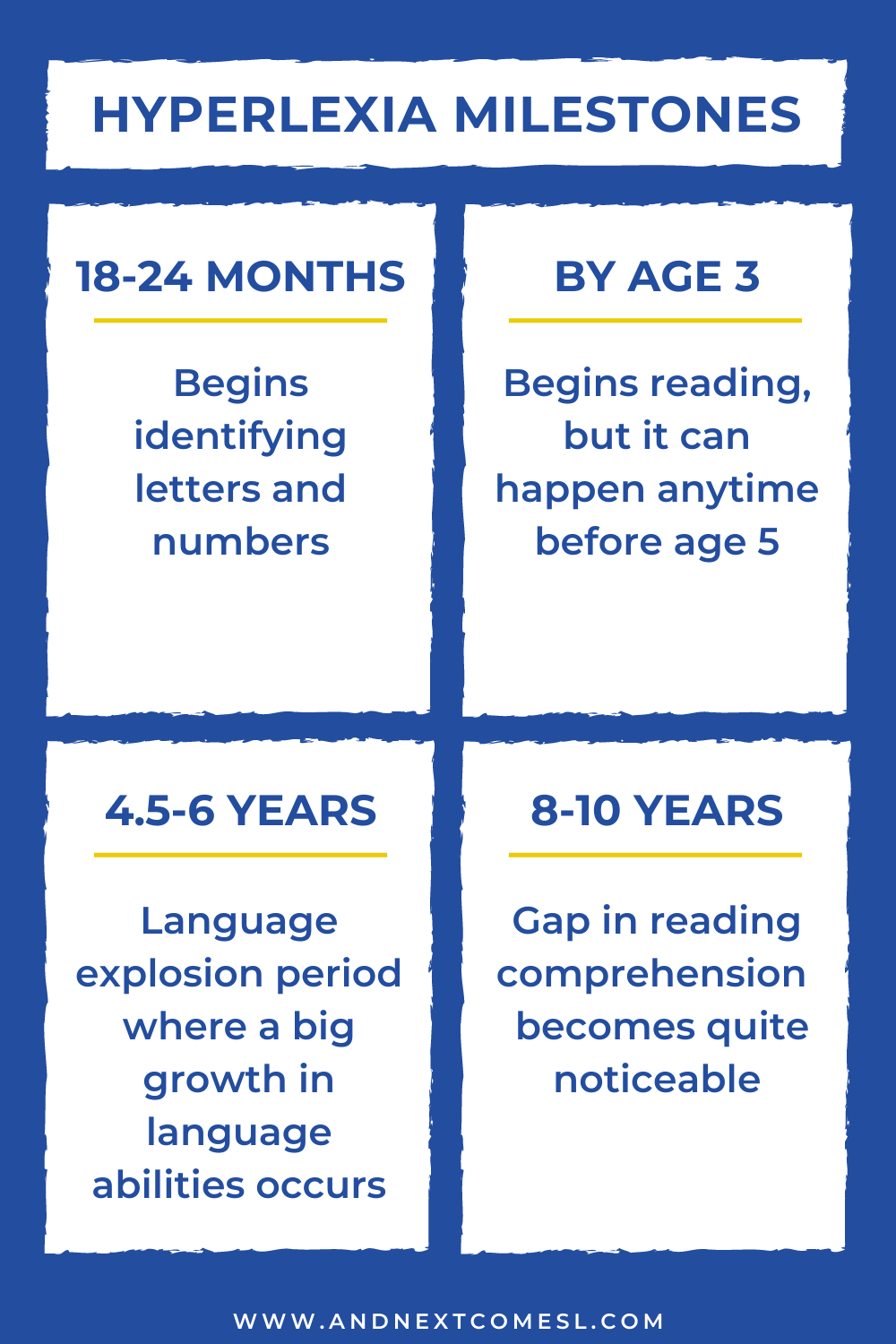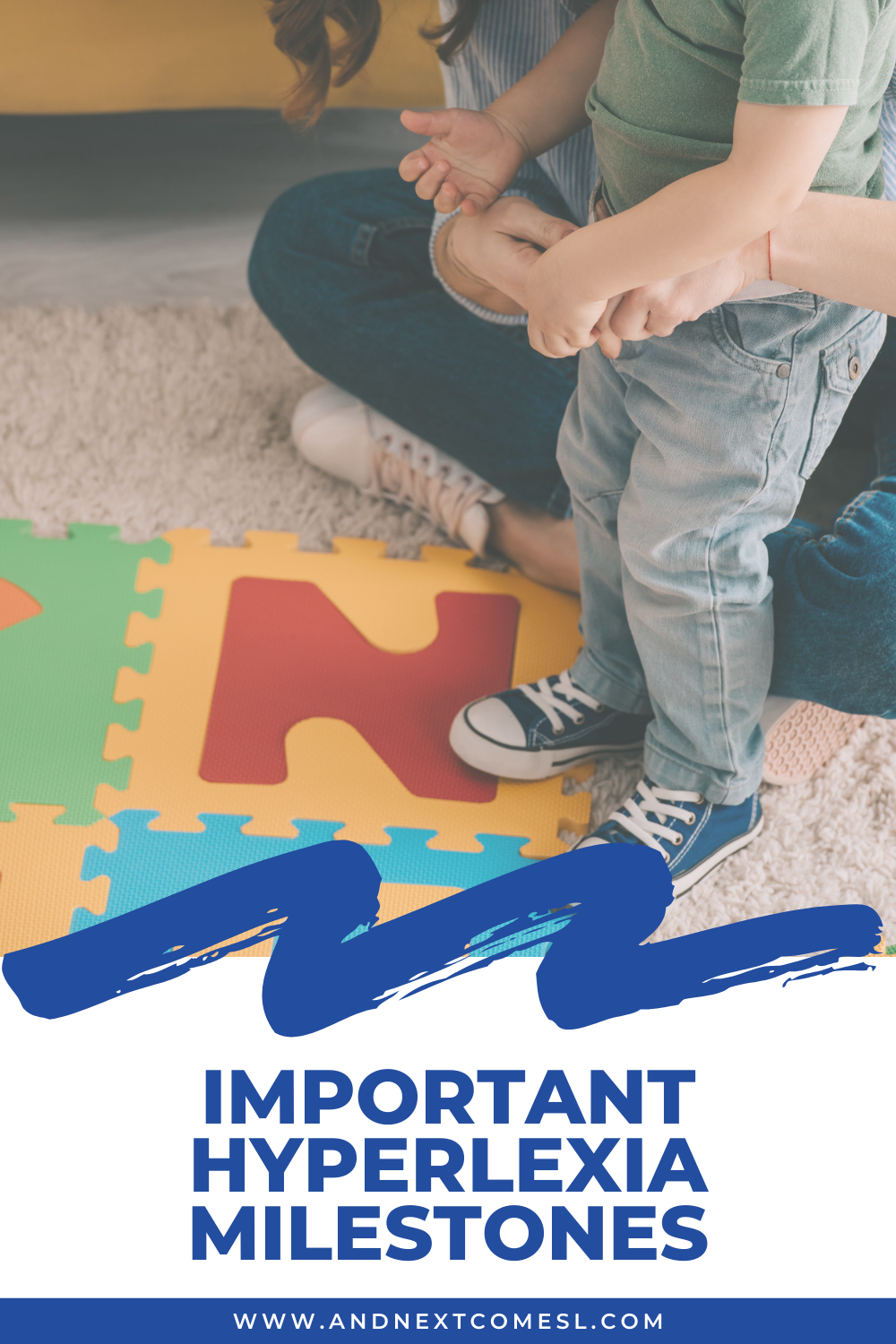Parents of hyperlexic children quickly realize that their child isn't going to follow a typical developmental chart.
And they're certainly not going to find a chart labeled developmental milestones of a hyperlexic child. Although that would have been nice to have.
But many parents wonder what to expect from their precocious little reader in the coming years, especially in terms of language development.
I recently shared a brief video on Instagram covering important hyperlexia milestones, but you can only cram so much into 15 seconds...So let's take a closer look at the development of a self-taught precocious reader and examine some of the important signs of hyperlexia and language development that you should be aware of.
But First...A Few Important Notes About these Hyperlexia Milestones
- Every hyperlexic child is unique. So please keep in mind that these milestones are just general guidelines and averages. Your hyperlexic child's journey might vary from the age ranges listed below. However, they will likely still follow a similar developmental path.
- These milestones are just meant to give you an idea of what to expect in the coming years. They are particularly helpful for parents who have a precocious toddler, have just learned of hyperlexia, and recognize that their child certainly isn't going to follow a typical developmental milestone chart.
- These milestones are just basic overviews of what to expect in terms of hyperlexia and language development. They do not delve into behavior or social domains. Although I touch on social language briefly.
- Comprehension abilities will vary widely so don't come at me with the whole "but my hyperlexic kid is three and understands everything he reads!" These issues become more apparent as they age, when the texts get harder and rely on more complex skills like inferencing, synthesizing information, etc. Some comprehension issues may be relatively mild, but most hyperlexic kids will have quite a pronounced gap between their decoding and comprehension levels.
- I'm obviously not an expert in childhood development. The milestones listed below are based on research, journal articles, and my own personal experiences and observations. And if you read some of the comments on my original video, you'll notice that many other families' hyperlexic children have followed the same developmental path as listed below.
Common Milestones for the Hyperlexic Child
Around 18-24 months, the hyperlexic child begins identifying letters and numbers (Kupperman et al., 1998). This is usually one of the first signs of hyperlexia that parents notice.
By age 3, the hyperlexic child begins reading, but it can happen anytime before age 5 (Kupperman et al., 1998). In our case, the precocious reading started just before my son's second birthday.
From 4 1/2 to 6 years of age is the language explosion period. During this period, hyperlexic kids see a "marked improvement in language abilities" (Kupperman et al., 1992). This language explosion might include less reliance on echolalia, fewer pronoun reversals, a boost in vocabulary, becoming a bit more conversational, and/or an increase in understanding WH- questions (who, what, where, etc.), for example. Kupperman et al. also noted, however, that difficulties with social language persisted and often do persist throughout adulthood for hyperlexic children.
At around the 4th grade, or between the ages of 8 and 10 years, is when the reading comprehension gap is often quite noticeable (Robertson, 2019). Robertson points out that, in the fourth grade, texts become more complex and there are changes in classroom expectations, including, but not limited to:
- More reliance on inferencing skills to learn vocabulary (instead of direct teaching) where they are expected to use context clues from the text to determine meaning
- Narratives are replaced by expository text
- More silent independent reading instead of whole group reading and, therefore, bigger expectations for comprehending materials independently
- More complex content academically which relies heavily on good background knowledge, schema, synthesizing information and concepts, and making connections
- More idioms, metaphors, and figures of speech throughout texts, which means inferencing skills become more important
Robertson notes that, "fourth grade also often marks the downward spiral point for students with hyperlexia, many of whom, once considered advanced readers, suddenly appear to develop a reading disability (Iland, 2011). This can be largely attributed to a number of atypical, but initially unrecognized, gaps in the students’ reading skills profile. While a rudimentary understanding of concrete concepts coupled with good memory skills is typically sufficient for academic success during the early grades, hidden deficits in reading skills begin to surface as classroom expectations change." (source)
Elaborating further on the comprehension issues of hyperlexia, Robertson says, "Although the deficits have been there all along, the abrupt shift in expectations related to reading in the later grades increasingly exposes the gap between decoding and comprehension." (source)
That's why it's important to work on comprehension skills with your hyperlexic child, right from a young age, even if comprehension issues aren't yet apparent or you believe their comprehension is fine. It will help ensure that the gap between decoding and comprehension is narrowed by the time fourth grade rolls around, setting them up for success in even higher grades.




